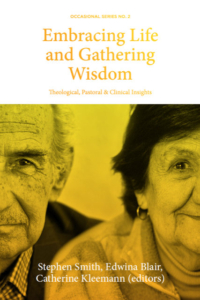Here are some reflections:
The great challenge for Christian aged care providers is to explore how our theology can best inform our practice, so we are the hands of God acting with compassion and grace towards the disadvantaged we are serving. From a Christian perspective, providers of care need to emphasise the whole person. Our personhood is connected to our soul, not our physique. As such, every person is immeasurably valuable and the focus for Christian care should always emphasise human flourishing as a reflection of the nature of God at work in the world today.
Simple demographics tell us that each year (for at least the next two decades) more of us than ever before will be over 70 years of age. But how do we age well? How do we cope and thrive when our life journey reaches its final stages.
Ageing invites loss: the potential for the fading of mental and physical abilities, the passing of youthful desires, the diminishment of independence, the unravelling of false pride, and the undoing of identity. So much can be taken away from people during this stage of life including the loss of loved ones, betrayal by family members, and consequences of financial impoverishment. For some the fear of ageing is palpable, ensuring a thriving anti-ageing market that seeks to deny the reality of our human state.
In growing old we each share in the inevitable future of our humanity. Yet ageing is not to be feared. It is a physical decay, but also a theological aspiration – the journey of the created meeting their Creator. In this lies the real difference in the anthropology of the Christian. An assumed purpose and personhood that results from being created in the image of God with the purpose of being in an intimate relationship with Him. In life, then in the afterlife.
The secular view sees humans as a physiological machine that houses sentient awareness; however, the Christian view sees the human body as a carrier of an eternal spiritual being. While the physical shell is in decline, the soul is maturing and enduring.
In this way the Christian approach to ageing is distinct when compared to a purely secular perspective. Christians live with the conviction that people are ‘soul beings’ first, and physical beings second. Our soul integrates the interplay of physical, psychological, spiritual and social health, and is an inseparable companion to every breath we take. When we experience ageing the search for meaning that emanates from our soul is radically sharpened. This is God’s calling to us, an inevitable search for the sacred.
The challenges of ageing cut profoundly to the heart of the Christian community. Our theological understanding of the nature of God demands more than mere kindness towards the elderly. Respect, care, and dignity are practical hands-on concerns. As C.S. Lewis noted in The Problem of Pain, ‘kindness without love leads to indifference, even contempt’, and we are surely called to something higher than kind tolerance towards our seniors. As Saunders writes, the ‘gentle neglect of people with dementia is not a worthy strategy for the church—and yet this is often the case in practice’.
The secular view would see humans as a physiological machine that houses sentient awareness; however, the Christian view sees the human body as a carrier of an eternal spiritual being. While the physical shell is in decline, the soul is maturing and enduring. Thus, our spirituality is an integral part of human health and not merely an influence on it. Spirituality pervades every part of who we are. It is bonded to our well-being in ways that seem incomprehensible.
For aged care providers, having a ’theology of care’ is as important as strategy, vision and mission as it cuts to the root of who we are and why we care for the disadvantaged. Our book hopes to highlight this challenge capture a balance of perspectives (theological, pastoral, and clinical), all dealing with the same question: How do we age well?

